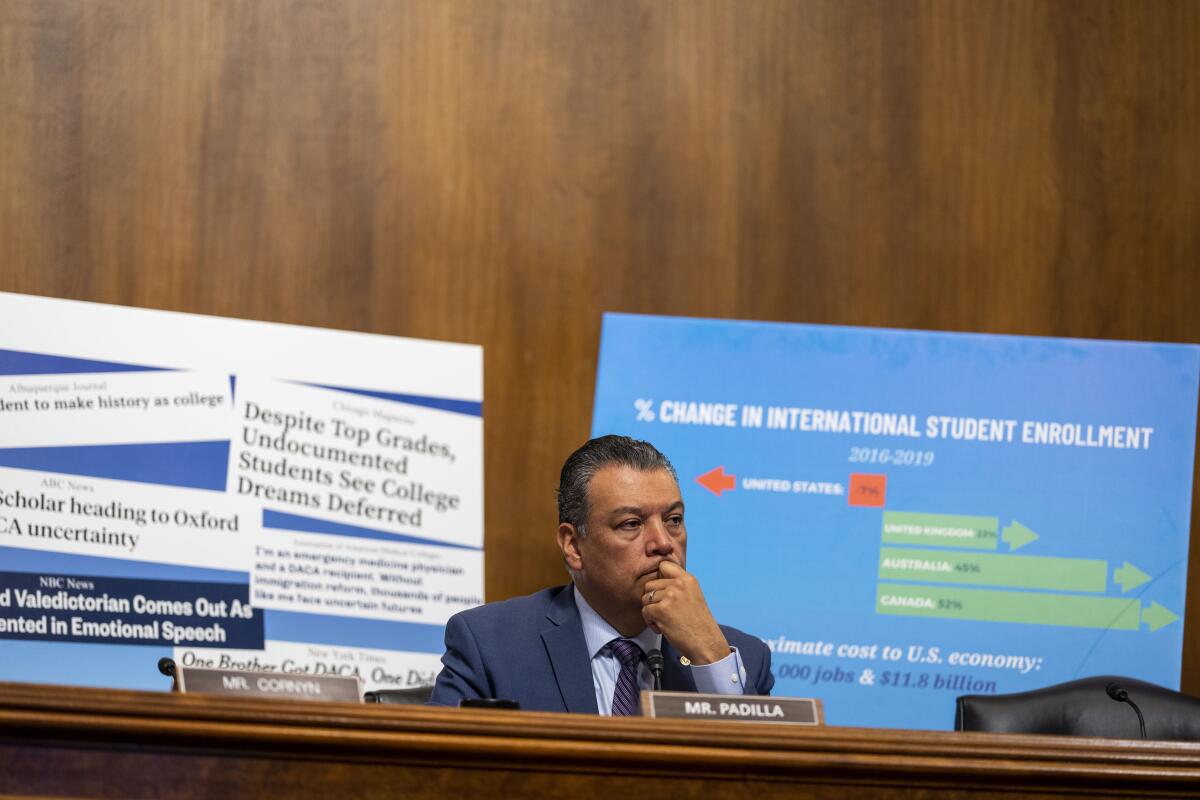Editorial: Ten years of limbo. DACA recipients need permanent relief now

One of the few issues most Americans can agree on when it comes to the thorny topic of immigration is that longtime residents who were brought into the United States illegally as children should be granted permanent status. Congress should seize the opportunity during the lame-duck session to pass such legislation before the end of the year.
With the Deferred Action for Childhood Arrivals policy in peril in federal court, California Sen. Alex Padilla has joined other Democratic senators to corral support to pass bipartisan legislation after Thanksgiving that would provide a permanent solution for these immigrants whose fates have been in limbo for years. Legislation could be a standalone bill or language attached to a must-pass government spending bill. Either way, such legislation would need the support of at least 10 Republicans and all 50 Democrats to pass. Padilla, who heads the Senate Judiciary Subcommittee on Immigration, Citizenship, and Border Safety, is appealing to common sense, making the case to Republicans that offering permanent residency to immigrants who’ve lived in the country most of their lives and work in essential jobs boosts the economy.
It’s a last-ditch effort to resolve a problem that’s hounded legislators for decades. There’s a short window of opportunity before Republicans take over control of the House, closing the door for at least two more years on any permanent fix. The House passed a bill to give “Dreamers” legal status in 2021. It’s time for the Senate to approve the legislation, which would allow it to reach President Biden’s desk soon.
President Obama created DACA by executive order in 2012 after Congress failed to pass a bill that would have offered young immigrants who met certain requirements the opportunity for legal residency. DACA has allowed more than 800,000 young immigrants in the U.S. to live, work and travel legally, but it was intended to be a temporary solution. It has survived legal challenges, but its fate will now be decided by a U.S. district judge who earlier had ruled in a lawsuit filed by several states led by Texas arguing that DACA is illegal. The U.S. Court of Appeals for the 5th Circuit has sent the case back to the judge for a final resolution.
The U.S. can’t afford to lose the talents of 700,000 DACA recipients just because a court ruling goes against us.
Instead of waiting for the resolution of that federal court case, Congress must find a way to offer permanent relief to the immigrants we’ve come to know as Dreamers, who are thoroughly American and have built lives here as college students, entrepreneurs, essential workers and valued members of every community.
Is this a long shot? Perhaps, but now would be a good time to remember that the original Dream Act was introduced in 2001 by Utah Republican Sen. Orrin Hatch and combined elements of two bills sponsored by Democratic and Republican legislators. The Dream Act’s initial bipartisan support eroded dramatically in the weeks after the 9/11 attack heightened security concerns.
Since then, various attempts to revive different versions of the Dream Act have fallen short in Congress because Republicans want stricter border controls. The border has been fortified in many ways through the years, yet the fate of Dreamers and other undocumented immigrants remains uncertain. DACA now symbolizes the long-standing failure by federal lawmakers to craft much-needed comprehensive immigration reform.
Despite its benefits, DACA leaves immigrants like me in a state of limbo, with no path to citizenship.
Poll after poll through the years show that most Americans want DACA recipients to be allowed to remain legally in the U.S. An analysis conducted by the conservative American Enterprise Institute in 2017 — at the height of Trump’s anti-immigrant hysteria — found that “Americans’ general feelings toward immigrants and immigration have become more positive in recent years.”
Of course, some people may prefer to have DACA recipients leave the country, perhaps thinking that these immigrants are a financial drain on taxpayers. But Dreamers contribute about $6.2 billion in federal taxes and $3.3 billion in state and local taxes annually, according to the nonpartisan Center for American Progress.
Granting Dreamers permanent status is of paramount importance for California, which is home to approximately 170,000 of the 600,000 current DACA recipients nationwide.
It’s time for senators to put aside their differences and show leadership in addressing the fate of Dreamers.
More to Read
A cure for the common opinion
Get thought-provoking perspectives with our weekly newsletter.
You may occasionally receive promotional content from the Los Angeles Times.












